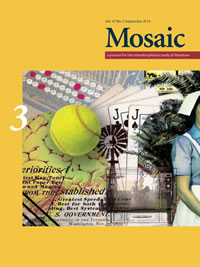Issue 47.3
Overview

General Issue
Published: September 2014
View the issue introduction or see the issue summary and contents below.
10 essays, totalling 192 pages
$21.95 CAD
The issue summary for this issue is unavailable at this time.
Reading the Spaces of Age in Alice Munro’s ‘The Bear Came Over the Mountain’Sara Jamieson This essay suggests that Alice Munro’s story “The Bear Came Over the Mountain” participates in a gerontological debate concerning the nature and meaning of residential care for older people, complicating a dominant interpretation of the old age home as a technology of social control that marginalizes and depersonalizes its residents. | |
Whorfianism in Colonial Encounters from Melville to MiévilleWill Nediger In linguistics, Whorfianism is a name given to the idea that language determines thought. This essay analyzes three novels (Herman Melville’s Typee, Juan José Saer’s The Witness, and China Miéville’s Embassytown) to examine how Whorfianism influences the description of “exotic” languages and cultures in accounts of colonial encounters. | |
Textual Authenticity and the Contemporary West: John McPhee’s Rising from the PlainsKenneth Millard A critical study of John McPhee’s Rising from The Plains in the context of recent debates about the status of regional studies in a postmodern culture, this essay asks what it means to be authentically Western in a late-twentieth-century culture comprising simulacra. | |
David Foster Wallace and the Ethical Challenge of PosthumanismWilson Kaiser David Foster Wallace’s fiction and prose express a strong ethical commitment that does not correspond to normative categories of behavior or normate bodies. Rather than abandon the problem of ethics, however, Wallace adopts an ethics of affinity, which explores the complex interplay of his characters’ private experiences. | |
Femininity and Effeminophobia in Manuel Puig’s Kiss of the Spider WomanJonathan A. Allan Manuel Puig’s Kiss of the Spider Woman challenges the critical understanding of male femininity and homosexuality. I argue that the privileging of homosexuality has meant that the study of femininity has been insufficient; as such, this essay draws on Eve Kosofsky Sedgwick’s notion of “effeminophobia” and studies Molina’s femininity. | |
Peut-on déplier les pilules de papier de Sherwood Anderson ?Daniel Thomières Cet essai est une interrogation sur la lecture, dépli-ement, expli-cation, compli-cation, multipli-cation, etc. Il porte sur une analyse de la nouvelle de Sherwood Anderson « Paper Pills », extraite de Winesburg, Ohio. | |
Precarious World: Rethinking Global Fiction in Mohsin Hamid’s The Reluctant FundamentalistJoseph Darda Through a reading of Pakistani author Mohsin Hamid’s The Reluctant Fundamentalist, this essay outlines a theory of critical global fiction: literary works that contest the forces inhibiting global understanding and advance international coalitions through this struggle itself. | |
‘I have more Sight than Sense’: The Sensorium in Taylor’s Meditations 38-40Mark Honegger This essay examines the sensory references in three poems by Edward Taylor, based on a relativistic approach to the sensorium, which may vary in different cultures and at different eras. The essay argues that abstract-to-abstract metaphorical mappings, as are found more often in poetry than in other genres, should better inform cognitive linguistic theorizing about metaphor. | |
Narrative Fiction, Experience-Taking, and Progressive Male StandpointsBrooke Lenz This essay explores the narrative strategies of Angela Carter’s The Passion of New Eve and John Fowles’s The Magus. The essay argues that, by encouraging and then deterring what social psychologists call readers’ “experience-taking,” the novels compel readers to entertain the protagonists’ progressive standpoints and to interrogate problematic gender norms. | |
Baudelaire and the Identity of the SelfNicolae Babuts Baudelaire points to “le conseil judiciaire,” the legal guardianship, as the central event that defined his self and the course of his life. Relying on studies of memory in neuroscience and on Baudelaire’s own views of memory and imagination, this essay studies the concept of the Baudelairean self. |